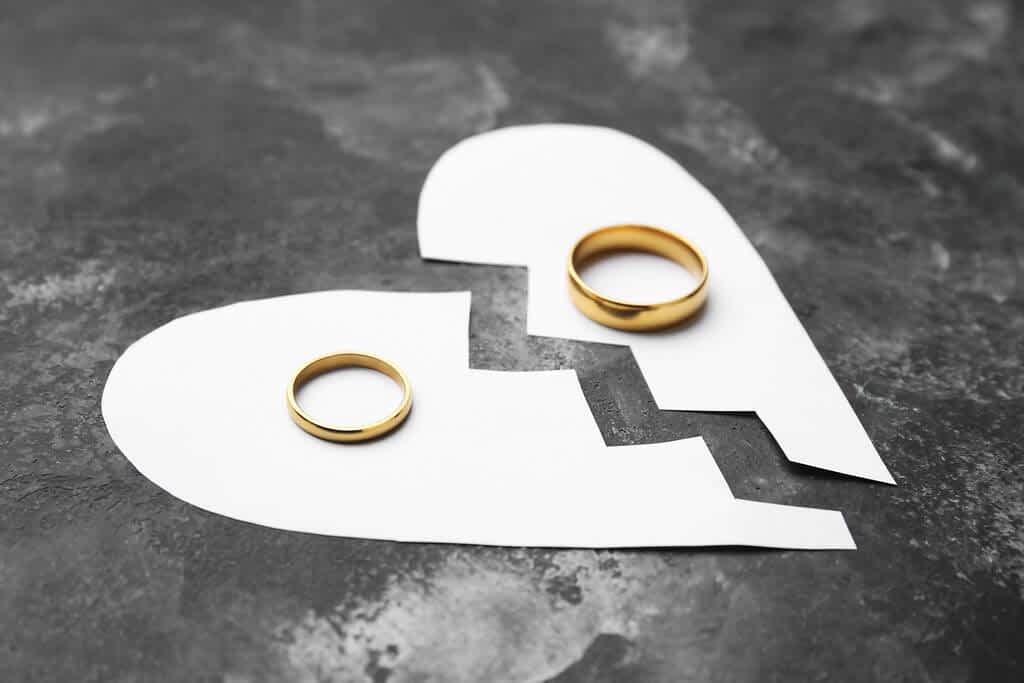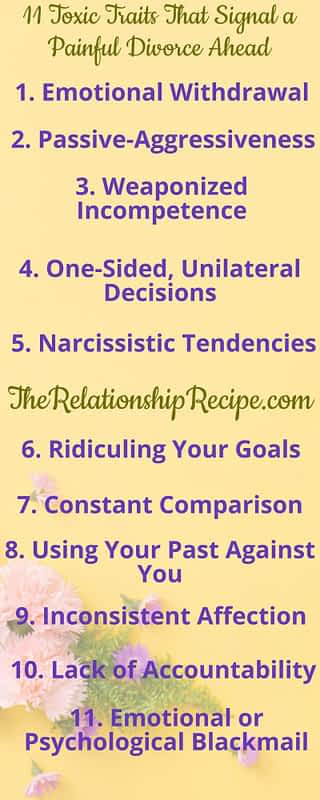11 Toxic Traits That Signal a Painful Divorce Ahead
Divorce is an emotional demolition derby that you might not see barreling toward you until it’s too late. The toxic traits that signal a painful divorce aren’t always obvious, but they’re the silent relationship wreckers ready to turn your life upside down.
You probably expect the usual drama: endless fighting, the cold shoulder, or those marathon arguments that never actually solve anything. But sometimes, it’s the deeper, more insidious behaviors that all but guarantee you’re headed for an awful, high-conflict divorce.
One of the scariest parts is not knowing how your spouse will react when the truth comes out. Will they be reasonable, or will they become the poster child for why some divorces turn ugly? You can’t always predict it, but you can watch for the red flags you’ll have a difficult divorce if you dare to look closely.
💡Key Highlights
- How to spot the traits that turn breakups into full-blown battlegrounds
- Why certain behaviors almost guarantee your divorce won’t be civil
- The subtle red flags that scream “this is going to get messy”
- What to expect when a high-conflict spouse enters divorce mode
- How to emotionally and legally prepare before it all hits the fan

How a Toxic Personality is the Reason Why Some Divorces Turn Ugly
Personally, I hate being blindsided by chaos I didn’t plan for. I’m a serial planner and definitely not someone who thrives on split-second decisions, especially when the stakes are as colossal as ending a marriage. I need time to think, weigh my options, and brace for impact.
It got me wondering just how much damage can a high-conflict spouse with toxic traits really do when a marriage is circling the drain? Turns out it’s a lot more than you’d expect. These traits don’t just disappear when you decide you’ve had enough; they tend to ramp up and become even more corrosive once the divorce process kicks off.
If you’re wondering why some divorces turn ugly while others stay relatively civil, look no further than your partner’s personality. A toxic personality is like lighter fluid on an already smoldering fire. What was stressful before can morph into full-blown warfare, dragging out every negotiation, every conversation, and every moment you’re just trying to get your life back.
Since everyone’s situation is a little different, think of this list as your heads-up… a preview of the red flags you’ll have a difficult divorce if you recognize these patterns in your spouse.
If these toxic traits were part of your marriage, don’t expect them to magically fade. They’re going to grow louder, nastier, and more disruptive as everything unravels.
Below, you’ll find 11 toxic traits that signal a painful divorce is likely looming. These are the behaviors that lead to high-conflict divorce, the warning signs of a nasty divorce you’ll wish you’d seen coming, and the reasons so many breakups end up being so much uglier than they ever needed to be.

11 Toxic Traits That Signal a Painful Divorce is Coming
💔1. Emotional Withdrawal
Your partner might be sitting right next to you, but if they’ve emotionally checked out, you’ve got a big problem on your hands. This isn’t just them needing “space.” Emotional withdrawal known as stonewalling is when they flat-out refuse to engage in real conversations. No vulnerability. No compromise. Just a brick wall where your spouse used to be.
When divorce is on the horizon, this behavior only gets worse. You’ll see resentment crank up to eleven, with every attempt at dialogue twisted into some kind of power struggle. They’ll act like you’re trying to control them simply by asking for clarity.
Emotional withdrawal doesn’t just hurt your marriage; it’s one of those toxic traits that signal a painful divorce is coming fast. Expect negotiations to feel like talking to a door. Every conversation will stall, and you’ll end up locked in nasty arguments over even the smallest details.
If you’re already dealing with this, don’t assume it’ll improve once lawyers get involved. Consider bringing in a professional mediator early on. Sometimes, a neutral third party is the only way to get a word past the stone wall.

💔2. Passive-Aggressiveness
Passive-aggressive behavior is the silent destroyer of relationships, and the not-so-silent one of amicable divorces. Instead of saying what’s on their mind, your partner prefers to sulk, drop snide comments, or punish you with an icy silent treatment.
Sure, it might look harmless in the beginning. Maybe you think, At least they’re not yelling. But don’t be fooled – this is slow-drip poison. Every unspoken grievance piles up until resentment is baked into every interaction.
Guess what? It doesn’t magically vanish the minute you file for divorce. If anything, it escalates. You’ll find yourself locked in negotiation talks that feel more like a minefield. Your soon-to-be-ex may “forget” to sign important papers or toss out backhanded remarks just to keep you off balance.
They might drag their feet over asset division or play games with child custody, turning the whole process into a drawn-out mess. This is one of those behaviors that lead to high-conflict divorce and a perfect example of why some divorces turn ugly fast.
If you’re stuck decoding mixed signals or wondering what they’re really thinking, brace yourself. This is a classic toxic trait that signals a painful divorce ahead. Stay assertive, document everything, and lean on clear communication, because you’re going to need it.

💔3. Weaponized Incompetence
You know exactly what this is; your partner suddenly “forgetting” how to do even the most basic chores or manage simple responsibilities. It’s annoying when you’re married, but during a breakup? It’s downright crazy-making.
Weaponized incompetence isn’t laziness. It’s strategic sabotage. When your spouse pretends they have no clue how to handle finances, childcare, or paying the electric bill, it creates chaos and makes you carry the burden alone.
If you think divorce will snap them out of it, think again. This is one of those classic red flags that you’ll have a difficult divorce. They’ll feign ignorance to dodge accountability for shared expenses or to stall decisions about dividing assets. Next thing you know, negotiations are stuck because they’re “confused” about how to do anything.
This behavior is one reason why some divorces turn ugly fast. You’ll be left cleaning up the mess while they shrug their shoulders like it’s all a big mystery.
Keep meticulous records of everything: who paid what, who handled which responsibilities, etc. And don’t be afraid to lean hard on your legal team. Clear documentation and firm boundaries are the only way to cut through this nonsense.

💔4. One-Sided, Unilateral Decisions
Ever feel like your partner treats you more like background noise than an actual partner? If they make big decisions without even bothering to loop you in, that’s not just inconsiderate; it’s a toxic imbalance that eats away at your relationship.
When one person calls all the shots, it breeds isolation and resentment. This dynamic doesn’t just vanish when you start divorce proceedings. In fact, it usually gets worse.
If your partner is used to unilaterally deciding how things work, expect them to double down during the split. They’ll refuse to compromise over major issues, whether it’s splitting assets, scheduling custody, or anything else that requires mutual agreement. This is one of those red flags you’ll have a difficult divorce ahead, because you’re fighting not just over stuff, but over their need to stay in control.
This power play is a big reason why some divorces turn ugly and drag on far longer than they should. You’ll end up feeling sidelined and helpless if you don’t set boundaries early.
To push back, come to every discussion with a clear agenda and a laser focus on negotiation instead of confrontation. And don’t try to do it all solo. Having a lawyer present can help keep the conversation grounded in reality instead of ego.
If you spent your marriage feeling more like an accessory than an equal, take a hard look at this dynamic now. Because once divorce is in motion, this toxic trait can morph into an exhausting, painful process you’ll wish you’d prepared for.

💔5. Narcissistic Tendencies
One of the biggest red flags you’ll have a difficult divorce with a narcissist is usually front and center. This is the partner who’s self-absorbed, emotionally unavailable, and always steering the spotlight back to themselves. If they dismiss your feelings and show zero empathy, you’re looking at behaviors that lead to high-conflict divorce, and a messy breakup no one wants.
Narcissists thrive on manipulation and control, and during divorce proceedings, this only gets worse. Expect twisted words, blame-shifting, and gaslighting tactics that leave you doubting your own reality. This toxic trait is a major reason why some divorces turn ugly fast.
In court, they’ll play the victim like they’re giving an Oscar-winning performance, dragging the process out and turning negotiations into an emotional battlefield.
To survive this, keep detailed records of all communications and bring in a therapist to help you process the emotional rollercoaster. Because when a narcissist is involved, these toxic behaviors make a painful divorce almost inevitable.

💔6. Ridiculing Your Goals
A partner should build you up, not tear you down. If they mock your goals or belittle your achievements, you’re seeing the red flags you’ll have a difficult divorce ahead. Ridicule isn’t just mean – it’s a weapon that chips away at your confidence and sets up a toxic power play.
When respect is missing from your relationship, you’re looking at one of the key warning signs of a nasty divorce. During the breakup, this partner will likely ramp up the criticism, trying to undermine your credibility, especially when it comes to alimony or custody battles.
This toxic trait leads to high-conflict divorce negotiations filled with hostility and sabotage. It’s not just about hurt feelings, or getting revenge; it’s nothing more than control and power, turning what should be a civil process into a battlefield.
Stay firm in your goals. Surround yourself with friends and professionals who have your back and can help you keep your confidence intact through the chaos. Because this kind of behavior doesn’t just predict a difficult divorce – it guarantees it.

💔7. Constant Comparison
If your partner keeps comparing you to their ex, friends, or family, don’t fool yourself – this toxic trait is a huge warning sign of a nasty divorce ahead. It’s not flattering; it’s downright damaging. Constant comparisons make you feel inadequate, like you’re never quite enough.
During a divorce, this behavior doesn’t just disappear. Expect your partner to use these comparisons as ammunition for highlighting your “flaws” to justify their actions or to demand an unfair advantage in negotiations. This toxic tactic fuels resentment and turns what should be a fair split into a high-conflict mess.
To survive, focus on your strengths and stay grounded in your self-worth. Keeping clarity about your value is your best defense against this kind of emotional sabotage during the divorce process.

💔8. Using Your Past Against You
This is serious. Your history should stay in the past. But if your partner constantly drags up old mistakes every time you disagree, you’re staring at one of those red flags that signal a difficult divorce is incoming. Rehashing past slip-ups isn’t about resolution – it’s sneaky way of using your regrets as emotional ammunition.
This behavior doesn’t just vanish when you file paperwork. In fact, expect them to weaponize your past to manipulate the narrative and justify their demands. It’s a classic tactic behind why some divorces turn ugly and spiral into unnecessary drama.
If they keep replaying your old mistakes, get ready: this toxic trait often leads to high-conflict divorce, emotional distress, and endless arguments that stall progress.
Protect yourself by lining up a strong support system. A therapist can help you process the guilt and resentment, while trusted friends and professionals will remind you that your worth isn’t defined by your past.

💔9. Inconsistent Affection
One minute they’re showering you with love; the next, you can’t even get a text back. If your relationship feels like emotional ping-pong, pay attention: this is one of those toxic traits that signal a painful divorce is coming.
This intermittent reinforcement and hot-and-cold routine isn’t just frustrating. It’s a classic warning sign of a nasty divorce and one of the behaviors that lead to high-conflict divorce down the line. When affection swings like a pendulum, it leaves you constantly guessing where you stand and erodes any sense of stability.
So don’t expect this inconsistency to go away once you file. During divorce negotiations, your partner might flip between being sweet and cooperative to petty and vindictive in the same week. This emotional whiplash is exactly why some divorces turn ugly fast.
Your best defense is to stay grounded and clear-headed. Keep reminding yourself of your goals, and don’t get sucked into emotionally reacting to every mood swing. The more you can keep communication straightforward and unemotional, the less power this toxic trait has over you.

💔10. Lack of Accountability
If your partner refuses to own up to their actions, you’re dealing with one of those toxic traits that signal a painful divorce in your future. Healthy relationships need accountability. When someone can’t admit mistakes or work toward solutions, it’s a recipe for resentment and collapse.
If your significant other constantly shifts blame or flat-out denies their role in conflicts, brace yourself because this toxic behavior won’t stop just because you’re divorcing. In fact, it’s one of the big reasons why some divorces turn ugly fast.
Expect them to dodge responsibility for everything, from the breakdown of the marriage to the mess of financial obligations. They’ll likely try to paint themselves as blameless while pinning every single problem on you. This blame game is one of the clearest warning signs of a nasty divorce ahead.
To protect yourself, keep detailed records of their actions and statements. Solid documentation (and a lawyer who isn’t afraid to call out the games) will help hold them accountable when they’d rather hide behind denial.

💔11. Emotional or Psychological Blackmail
This one’s a doozy and one of the biggest red flags you’ll have a difficult divorce. If your partner uses guilt, fear, or threats to get their way, you’re not in a relationship – you’re in a power struggle. Emotional and psychological blackmail is manipulation, plain and simple. And it’s a major flashing neon sign you’re heading for a high-conflict split.
That need for control won’t magically disappear during a divorce. It’s one of the clearest behaviors that lead to high-conflict divorce and why some divorces turn ugly fast. Expect threats, emotional pressure, and underhanded tactics designed to wear you down and push you into agreeing to their terms.
Set firm boundaries and bring in legal pros who won’t blink when your ex starts the manipulation game. This is not the time to play nice; it’s the time to protect your peace, your rights, and your sanity.

Final Thoughts on the Warning Signs of a Nasty Divorce
Ignoring these toxic traits that signal a painful divorce is like pretending a fire isn’t happening because you don’t feel like dealing with it. It’s still going to burn your house down.
You deserve way better than a partner who turns every disagreement into psychological warfare or who thrives on behaviors that lead to high-conflict divorce. If you’re spotting these red flags you’ll have a difficult divorce, consider this your official permission to stop making excuses for them.
Recognizing why some divorces turn ugly and seeing the warning signs of a nasty divorce for exactly what they are, gives you the upper hand. You get to prepare, set ironclad boundaries, and build a support system that won’t crumble under pressure.
So keep your head high, your receipts handy, and your lawyer on speed dial. You absolutely have the grit to navigate this mess with your self-respect intact, and maybe even a little smug satisfaction that you saw it coming. 💪
Thank you for reading this post, don't forget to subscribe!







